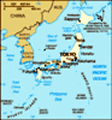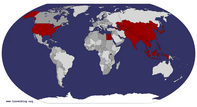Advertisement
Published: June 27th 2009

 Chinatown
Chinatown
This is the Japanese chinatown...nice, friendly, clean. Think amusement park with pork buns. And absolutely NO KNOCKOFF GOODS (Japanese fear knockoffs like they fear....well...)I'm just going to keep a running entry of my circle. It's easier that way. Please keep checking this time to time because I ultimately want to get all of my experiences down with this amazing group, but I will never be able to.
I am in a Fair Trade advocacy group called Cafaire. We are a recognized circle by Waseda and try very hard to spread the word about Fair Trade and get the Japanese (who don't change easily) to wake up to the fact that fair trade is out there. For those of you who don't know, fair trade is a movement that ensures that importers and trading companies do not exploit 3rd world producers in their purchases of coffee, cocoa, tea, fruit, honey, wine, etc. There are a ton of raw materials that are covered by the movement. What I like about it is the consumer advocacy, consumer awareness side promoting safer, higher quality products rather than the "save the poor people" side, but both are means to a better end. Ultimately it is the consumer with the power in this case because fair trade licenses sellers and trading companies to affix the fair trade logo to
their products, hence giving them a boost of brand value...for those who know about fair trade. And thats the catch, if consumers don't demand it, it doesn't happen. That's kind of the role I have grown (along with my Japanese language) to play in the group. The club was originally founded under a volunteering umbrella, a little too 3rd world country/producer oriented I thought to be effective. In America, at Lafayette, the group is much more consumer oriented so I wanted to bring that other half to this group.
In philosophy and numbers, the group has grown tremendously. I brought a little American philosophy to it, but the core members, Kaneko "Joseph", the club leader, Ayako, who lived 10 years in Bedford, NY of all places, Gen, a 3rd year student who can draw anything to promote fair trade, and Jin, one of my best Japanese friends, took the club from 10 members last semester with 6 or 7 regulars participating in meetings to a whopping 33 this semester with over 20 at meetings regularly. It's unbelievable the drive they have and how they have attracted so many amazing, hardworking students from different schools and broadened the scope of
the events. These past 2 months I've been doing something with them at least once a week, outside of hte meetings, event-related.
I'm going to write about the meetings, the social climate, how we all have all grown on eachother, some cultural stuff later, but since we are all one big happy family at this point I want to talk about our trip to Yokohama.
A new member, from another school, wanted to put together a trip for all of us to go to Yokohama for a day, eat in Chinatown, see the port, then go drink afterwords. And he did, marvelously. What a great time. We cruised aroudn Chinatown for an hour, stuffing or faces with porkbuns and shuumai, stopped in a retro American diner and ate a gigantic sunday and real cheesecake (not the stupid fluffy cake they usually have, dense as hell NY style cheesecakes), went on a roller coaster at the amusement park, and finished the night in the pouring rain getting drunk at an izakaya. I was 30 seconds away from missing my last train...it was that good. That's all for now...more serious stuff later.
I guess Ill go into some of
the meetings now. We meet once a weekm tuesdays, from 6:15pm to whenever things are done, which could be a really long time. We have gone as long as 9:45 and that is when the building closed and we were thrown out. Its better now, but for the first part of this year 3 hours plus of Japanese was pretty hard to handle. My attention span only went to a point then it was like hitting a wall. Yes, things are accomplished at the meetings, but not enough to qualify for 3 or more hours. In all honest, after certain tasks are delegated at the meetings, most of the work goes with the individual or group. What takes so long is to delegate not as much who...there are plenty of people who particiapte fully in the club, but what. Things are discussed to minutia, but decisions are very slow. Everything I read about the japanese system of [url=http://www.kirainet.com/english/nemawashi-%!E(MISSING)6%!A(MISSING)0%!B(MISSING)9%!E(MISSING)5%!B(MISSING)%!E(MISSING)%!E(MISSING)3%97/nemawashi in the corporate context absolutely applies in the cirlce as well. They talk, what seems like endlessly, and very rarely do we walk away with a complete decision. It is very frustrating so sit and watch when you are used to meetings
being forced into a 1 hour time frame and decision getting made very fast after a short discussion, whether everyone agrees or not. Joseph asked me about the meeting back at home and I told him that we go much shorter, everyone gets their opinion on quicky, we make the decision and move. To be honest, perhaps the group has no choice, because that is how Japan works. When a system is place, there is precident, a decision has been made, things move like clockwork. When there is a change, an exception, something new, it takes days, months, even years (like a new club to start up and get recgonized takes a 2 year process of paperwork) and whole bunch of frustration. From adding one chair to a table at a restaurant to let a party of 6 rather than 5 sit down, to getting the college cafe to ADD, not replace, their regular blend with fair trade blend, involves lines of red tape and bull. That is part of the reason I respect the club so much, is that they are trying to change an element of society that resists it.
Side note on society - I know
Ive gone on before about the importance and value that 国産 国内産 (Made/grown in Japan) means to Japanese. It gives them reason to pay 2 or 3 times more for that product. Why? Because they feel it is safe, impossible to be contaimanted by the outside. I think there is very little feeling of Buy Domestic, for economy purposes. For that reason, that Japanese very willingly pay a lot more for a sticker saying essentially SAFE, Fair Trade, if that angle is market correctly, should be huge here. People see the sticker, know it was produced fairly and safely, quality is better, and buy it. Japanese people spend, alot. Especially on what is perceived is safe and authentic (knock-off products are a sin here). For a society geared to fashion, outward appearance, safety, consumerism, FT should be a hit if market with a consumer-orientation.
Now we come to one of the parts I disagree with within the circle. It was founded within a larger volunteer organization and with the outlook more towards helping producers than educating consumers. Japanese people care much less than others about what goes on outside of their "Circle" being country, family, club, or otherwise, which is

 Mariko and Rina
Mariko and Rina
Rina is coming to the US next year...exchanging from SILS to Cali for the school yearwhy I dont think this attidute will fly with FT in Japan. I was talking to my english students recently about volunteerism and charity, and although volunteerism on a regular basis is coming around, my students said many Japanese harbor a fear or dislike of charity. FT is great because it is not charity, it is consumer advocacy and conciousness that helps producers in far away places. If the consumer conciousness is there, the aid follows naturally.
Next, because I joined one, I got to see first hand how a "circle" works in Japan. There is a definite reason these are called circles and not clubs. Circle fits in much better with the in/out structure that goes on in/out of them. In is IN. People relax, speak openly, no formal language, laugh, have fun, go to lunch, act like American college students. Out is OUT. Nervous laughter, use of language as a barrier, bowing, seriousness. When I first joined, I was somewhere in the middle. As the only foriegner, I dont think the club knew what to do with me, other than smile nervously and act nice. As my language got better, and I proved I could and wanted
to participate (a process in itself that took until maybe April), I moved IN. People opened up. I have lunch with them, joke with them, work as equals and IN. Looking at this attitude from a college-level and student life standpoint, I miss Lafayette a lot. Waseda has many, hundreds of close-knit, intense circles that do their activities and members participate, on a level that would make a lot of american clubs jelous. However, and this is a big however, there is very little sharing or exchange between these cirlces. Both on formal terms like holding purely student sponsored events together and having mass turnouts, and informal terms like outside socializing. Social circles tend to coincide with the club circle.
Advertisement
Tot: 0.376s; Tpl: 0.012s; cc: 10; qc: 48; dbt: 0.0621s; 1; m:domysql w:travelblog (10.17.0.13); sld: 1;
; mem: 1.2mb
















mom
non-member comment
circle
this circle and your membership in it has contributed greatly to your blossoming in the Japanese culture. I am thrilled that you had the foresight to evaluate and join, regardless of the initial differences and difficulties with language, customs etc. Again, you made an excellent choice for yourself, and for them also. They have benefited greatly from you membership also.